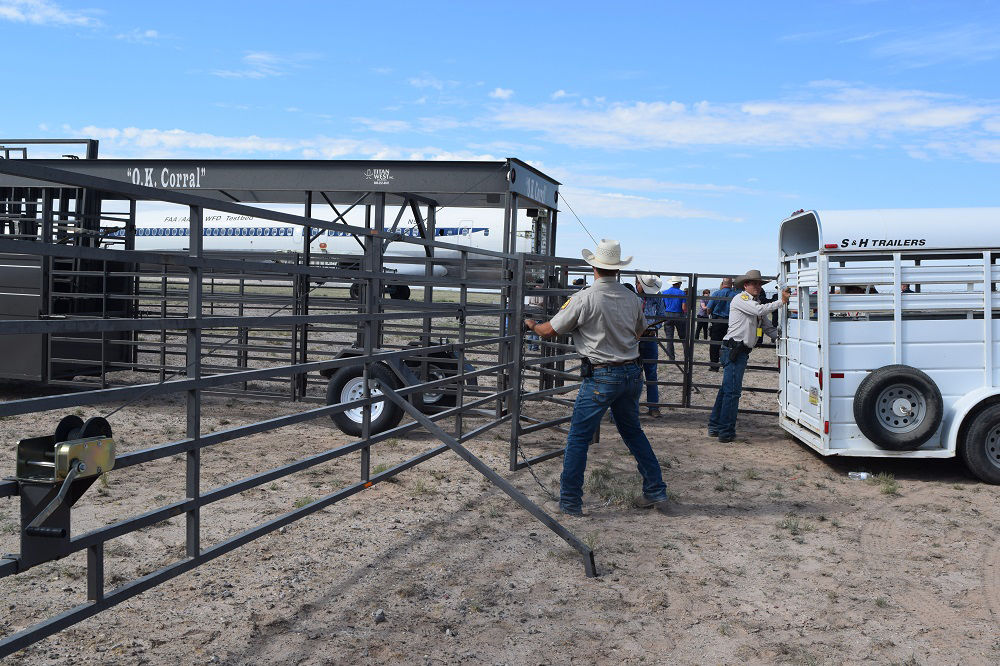It’s not every day you see an aircraft carrying 200 cows land at the Albuquerque International Sunport. But it could happen.
And if it does happen, the New Mexico Agriculture Livestock Incident Response Team is ready to respond.
Federal, state and local agencies came together recently in Albuquerque to host an animal husbandry and biosecurity exercise to prepare responders for a potential emergency incident involving livestock in New Mexico. The full-scale emergency exercise tested Emergency Support Function #11, which is the Federal Emergency Management Agency’s support function related to agriculture and natural resources.
Individuals from the state, as well as Washington D.C., played major roles in the planning and execution of the exercise. Professionals from the following agencies participated: Albuquerque Fire Rescue; Albuquerque International Sunport; Albuquerque Police Department; Bernalillo County; EXPO New Mexico; Federal Bureau of Investigation; Federal Emergency Management Agency; New Mexico Department of Agriculture; New Mexico Homeland Security and Emergency Management; New Mexico Livestock Board; New Mexico National Guard; New Mexico State University (Extension Veterinarian, Veterinarian and Southwest Border Food Protection and Emergency Preparedness Center); Transportation Security Administration; and U.S. Customs and Border Protection.
New Mexico ALIRT is a group of trained New Mexico-practicing veterinarians who would respond to a livestock disease outbreak in the state. Each year, ALIRT members train for potential animal disease and for the proper usage of personal protective equipment.
The livestock emergency simulation began with a call from the Albuquerque International Sunport tower indicating that a long-haul cattle transport developed mechanical problems and needed to make an emergency landing in Albuquerque.
While there were not actual cows on site during the exercise, emergency responders needed to make many quick decisions throughout the day, knowing it would take at least 48 hours to repair the plane. Decisions had to be made about the following:
Who would inspect the 200 pregnant cows?
Where would the cattle temporarily be held?
How would the cattle be transported?
What steps would be taken when the cows showed signs of illness?
On top of those decisions, the exercise included several scenarios, such as a cow running loose on the tarmac, a stow-away discovered in the airplane, protestors obstructing the cattle transport pathway and a large 4-H event taking place at EXPO New Mexico during the arrival of the cows.
Kelly Hamilton, NMDA agriculture biosecurity coordinator, said the experience demonstrated the ability for various agencies to work together.
“This exercise showed the level of communication and coordination possible between local, state and federal entities,” said Hamilton.
The New Mexico Department of Homeland Security and Emergency Management funded the exercise, which it is fully compliant with all of the stages of the Homeland Security Exercise Evaluation Program requirements.
The NMSU Extension Veterinarian and the NMDA Veterinary Diagnostic Services Director work closely to keep ALIRT members trained, exercised and ready to respond. The veterinarians coordinate trainings with the NMSU Southwest Border Food Protection and Emergency Preparedness Center.
Tim Hanosh, NMDA’s VDS director, said the New Mexico ALIRT program continues to prove itself as an important asset for the agriculture community.
“The ALIRT veterinarians are a group of practitioners, strategically located throughout the state, who have been trained to respond to unusual livestock situations,” Hanosh said. “Regular trainings are paramount to the success of the program. They not only sharpen our skills, they give us the opportunity to interact with multiple local, state and federal agencies, all of whom may be significant resources during an actual emergency.”
The ESF #11 and the New Mexico ALIRT went into action in a real-life situation just hours after the training exercise. A semitruck hauling 155 pigs was stopped by a New Mexico State Police officer on I-40 in Albuquerque. To avoid overheating, the pigs were transported to EXPO New Mexico. Emergency responders included the New Mexico State Police, New Mexico Livestock Board, Albuquerque Fire Department and New Mexico Department of Agriculture.
Whether there are cows on an airplane or pigs on a semitruck, New Mexico ALIRT is ready to respond.




